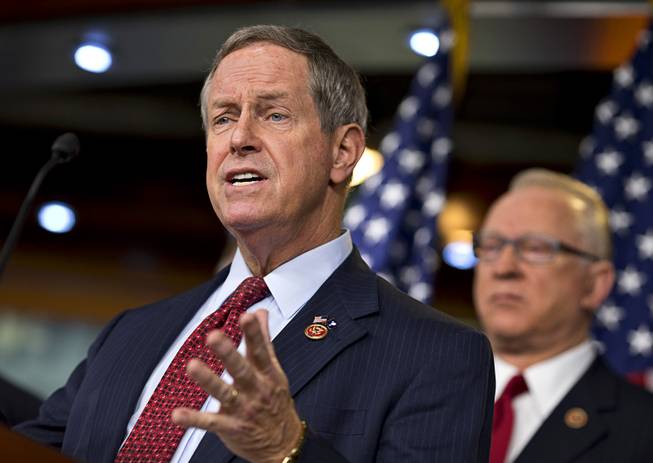
J. Scott Applewhite / AP
Rep. Joe Wilson, R-S.C., left, accompanied by House Armed Services Chairman Rep. Buck McKeon, R-Calif., gestures during a news conference on Capitol Hill in Washington, Friday, March 1, 2013, to talk about the effect of automatic budget cuts on the military.
Thursday, Jan. 12, 2017 | 2 a.m.
Related news
U.S. Rep. Joe Wilson, R-S.C., introduced legislation Wednesday that intends to block any new defense nuclear waste disposal facilities while the fate of Yucca Mountain in Nevada remains uncertain, all while emphasizing the need for a pathway out of South Carolina for high-level nuclear waste.
The legislation is called the Sensible Nuclear Waste Disposition Act.
Yucca Mountain was approved as the U.S. site for high-level nuclear waste in 2002 and was under development until 2010. Funding was cut by an amendment to a Department of Defense appropriations bill, shuttering the project.
The U.S. Department of Energy published in December 2016 a new plan to establish a new repository through a "consent-based" approach. That plan is forecast to take many years to designate a new site and requires the input and consent of communities near potential sites.
"Now, in the twilight of the Obama presidency, the administration is trying to abandon Yucca Mountain and find a new repository for nuclear waste — leaving communities across the United States, including the Aiken-Barnwell community in the Second District, to bear the burden of storing nuclear waste that the federal government has promised to remove, while perpetuating a possible threat to communities nationwide," Wilson said in a statement to media.
Wilson categorized Yucca Mountain as expensive and important to South Carolina residents.
"South Carolina ratepayers have invested over $1.3 billion into Yucca over the last 30 years — that's in addition to the billions other taxpayers have put into Yucca. Starting over with another project would cost billions from taxpayers and South Carolina ratepayers, and would take decades to complete," he said.
Wilson continued, "Meanwhile, South Carolina would remain a de facto repository for nuclear waste. The federal government should finish what they started — or, at the very least — should make an official decision on Yucca before wasting billions of dollars on a duplicative facility."
Wilson and other lawmakers have consistently called on the Energy Department to finish projects that would expedite removal of nuclear material from the Palmetto State.
Language in the bill is specifically directed at the Nuclear Regulatory Commission, which is the final approving authority for the Yucca Mountain licensure. Some tunnels and basic facilities were installed before 2011 during research activities.
According to a spokesperson with the NRC, to advance progress and begin construction activities, a hearing must be held. That hearing would require the participation from the Energy Department, which was the entity that ceased funding activities in 2010.
The NRC completed a technical review of the facility, and a spokesperson said the organization is a licensing authority but can't come to final conclusion until a hearing is complete. The hearing would require fund appropriation from Congress.
According to a report from Government Accountability Office released in May 2011, the decision to withdraw from the Yucca Mountain plan was made for political reasons, not technical or security concerns.
The month-old "consent-based" draft plan aims to designate a new facility over the course of the coming years. This legislation, though, would block that plan until the fate of Yucca Mountain is decided if the bill becomes law.
In the bill's text, which is only three pages in length, says the Secretary of Energy's ability to execute the "consent-based" plan would be stymied until the hearing. The bill says the Energy Secretary would be prohibited from planning, developing, or constructing a defense waste repository until the NRC has made a final decision.
As President-elect Donald Trump's administration moves into power later next week, a new secretary of Energy will be the deciding factor for the DOE. Former Texas Gov. Rick Perry has been tapped for that position.
It is unclear how Perry will handle the Yucca Mountain case, but some of his fellow Republican lawmakers have continued to call for a revitalization of the project since it was choked out in 2010.
The bill is co-sponsored by Reps. Jeff Duncan, R-S.C., and Kevin Cramer, R-N.D. It will go before the House Energy and Commerce Committee before facing a vote on the House floor. A timeline for those events has not been established.

Join the Discussion:
Check this out for a full explanation of our conversion to the LiveFyre commenting system and instructions on how to sign up for an account.
Full comments policy